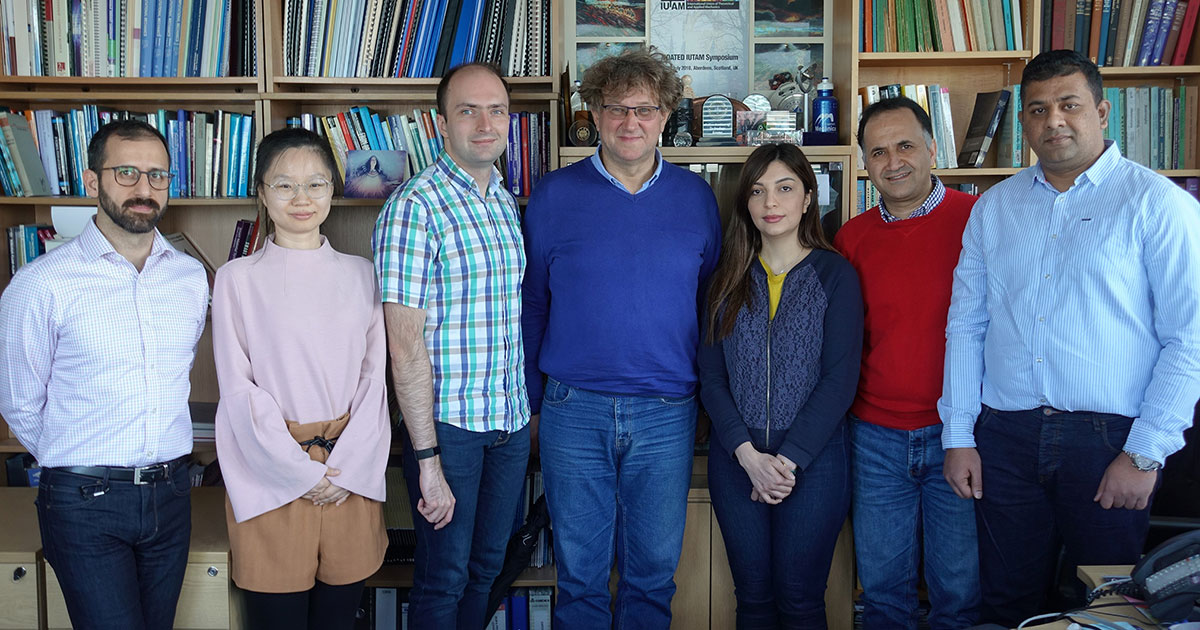The Oil & Gas Innovation Centre (OGIC) is supporting projects worth more than £1.3 million which will see the University of Aberdeen’s Centre for Applied Dynamics Research (CADR) team develop new technologies for use in offshore drilling operations.
 OGIC has provided a total of £640,000 of co-funding for the seven projects which will see the CADR team partner with five companies to develop innovations including an automated programme for testing well integrity and a new drill-bit.
OGIC has provided a total of £640,000 of co-funding for the seven projects which will see the CADR team partner with five companies to develop innovations including an automated programme for testing well integrity and a new drill-bit.
The CADR team’s work with industry has recently been recognised with the University of Aberdeen Award for Success in Engagement with Industry. This award recognises innovative research, a significant breakthrough or a major contribution to a team’s field.
Mhairi Begg, Project Manager at OGIC, said: “We have worked on a number of projects with the CADR team and their commitment to developing pioneering technology to better the industry has always been evident. The feedback we have had from companies that have worked with this team has been exemplar and the collaborations have resulted in the development of technology which has the potential to maximise economic recovery from the UKCS.”
Professor Marian Wiercigroch, Director of CADR and PI on all those seven projects, explained: “OGIC projects are short and focussed on delivery, are all about the team effort and without exceptional project organisational and technical skills of all members of the team, in particular of Drs Vahid Vaziri and Marcin Kapitaniak, the quality and efficiency which was praised by OGIC would not be possible.”
The projects have seen the CADR team partner with companies Volcanic Basin Petroleum Research Ltd (VBPR), Welltec, READ Cased Hole, RotoJar and Varel.
The two most recent projects will see CADR working with READ Cased Hole and Welltec.
The first new project will see READ Cased Hole work with the CADR team and AI experts from The University of Aberdeen’s School of Engineering to develop an automated programme to process and analyse data which is gathered by a multifinger caliper when it is testing the integrity of downhole completion items. The ultimate aim of the project is to develop technology which can deliver fully or partially automated well integrity reports.
The CADR team is working to develop the initial algorithm and test it.
Following the successful completion of phase one, Welltec will work with the CADR team on phase two of a project to develop a new tool. This will involve the re-design of a Welltec tool, incorporating the new technology which has been developed by the University of Aberdeen’s CADR team. The technology significantly increases ROP, reduces vibrations of the drill-string for conventional drill-bits and a much lower axial force (weight-on-bit) is required without compromising ROP or borehole stability.
The CADR team also worked with RotoJar to test its new tool designed to do the job of a drilling jar. Traditionally, drilling jars are employed to allow the jarring of a drill pipe if it becomes stuck during operations. The current technology has not been updated for many years and is limited in its functionality.
RotoJar has developed new technology which introduces drill pipe rotation to induce the necessary impact, delivering highly precise, controllable, and importantly, high frequency jarring. The key benefit arises from the high frequency impulse delivered by the Rotojar tool, creating desirable vibrations within the stuck drill pipe to vastly improve the ability to free the trapped portion of the drill string.
The VBPR team worked with the University of Aberdeen to test the effectiveness of Resonance Enhanced Drilling (RED) for coring drill bits. The project tested if RED technology can be used effectively with a coring bit, attain equal or improved core quality for the homogeneous test rocks and improve rate of penetration (ROP) of core cutting without losing quality.
Varel UK Limited joined forces with the University of Aberdeen to develop a new polycrystalline diamond compact (PDC) drill-bit, which will combine shearing and gouging actions. This would allow drilling in hard rock and heterogeneous formations much more efficiently.
OGIC and the CADR team supported phases one and two of this project which resulted in the creation of a prototype drill bit.
Ian Phillips, OGIC’s Chief Executive, added: “At OGIC we support a wide range of projects developing near-to-market oil and gas technology. These projects are excellent examples of the opportunities which exist in just one area of oil and gas operations to enhance production operations.”
Dr Liz Rattray, Director of Research & Innovation at the University of Aberdeen, said: “We very much welcome the commitment shown by OGIC and our industrial partners in working alongside our Centre for Applied Dynamics Research, a recent recipient of the University’s Award for Success in Engagement with Industry.
“The University has long been at the forefront of research aimed at supporting the oil and gas sector, and the CADR is in the vanguard of activities leading to the development of pioneering technical solutions that will benefit industry.
“These projects are testament to our ongoing commitment to industrial engagement, as well as to the quality of our world-class research teams here at the University of Aberdeen.”


